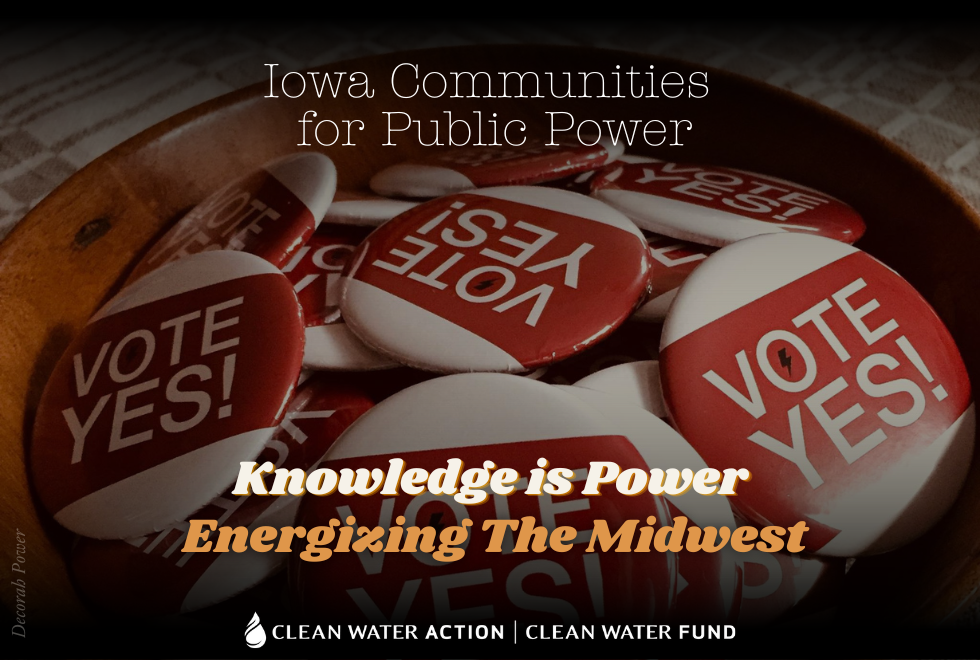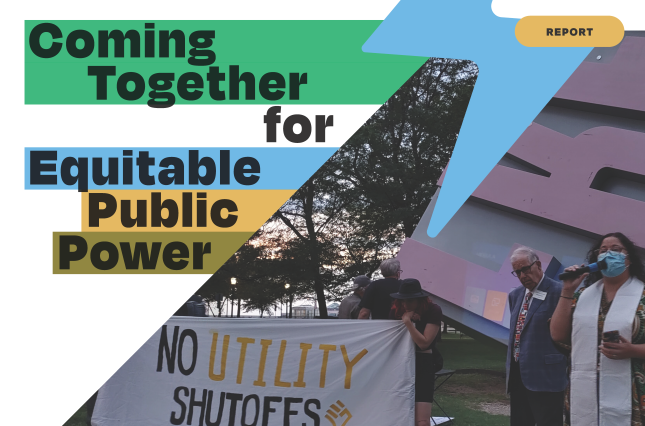
The Public Power Project is a work of passion and collaboration for a better energy future. Over the past year we took to the road and were able to see communities fighting to hold their utilities accountable, municipal utilities working hard to keep supplying power to their rural towns, and activists who are pushing their local governments to break from extractive investor owned models and transition to municipalization (creating a publicly owned power utility). Let us take you across the Midwest to share insights in this new blog series "Knowledge Is Power: Energizing the Midwest" and accompanying report, Coming Together for Equitable Public Power.
Part 4: Iowa Communities for Public Power
Iowa was a wealth of knowledge for the Public Power Project. The cities of Decorah and Des Moines have each recently been through a municipalization fight and are pushing toward public ownership of their electric utilities. When compared to other states utility service is reliable and the pace of clean energy going well, what was the motivation driving residents to organize for public power?
DES MOINES
In Des Moines we came in contact with organizers in the service area of the second major investor owned utility (IOU). MidAmerican, which is headquartered in Des Moines, gives about 100K a year in state elections and funds local projects with the city. Des Moines is their largest customer at a population of over 212,000. We found that the reliability issue that many ratepayers are experiencing in other states under IOUs is not something a typical Iowan experiences. MidAmerican brags of 60% of their power coming from wind. With the transition to a greener economy in mind and relatively low rates compared to Alliant Energy, Iowa’s second and smaller IOU, we wanted to know what motivated this community to start organizing.
In 2021 the city set a goal of 100% carbon free electricity by 2035 and to half their emissions by 2025. In 2022, the city’s franchise agreement expired. Knowing franchise agreements were a point of leverage for the city as a franchisor to the incumbent IOU, organizers lobbied city council members and organized outside pressure to email and call council members and give public comment. Organizers wanted the city council to pass a resolution to explore municipalization and revoke their IOU’s franchise. They were able to build a coalition to march and otherwise engage the press. Though the city did pass a resolution 7-0 to explore municipalization, this unfortunately did not materialize into a feasibility study - a professional analysis of municipalization as an option for that particular city and usually the first overt step toward municipalization. Instead the city signed another franchise agreement with MidAmerica. They did however reduce the term of that agreement from 25 years to 15 years and secure agreements to help meet the city’s climate goals and data sharing.
DECORAH
From there we explore Decorah where a group, Decorah Power, has been working to municipalize the city. Decorah has the highest solar generation per capita in the state and we again found their investor owned utility, Alliant Energy, does not have a reliability issue. This conversation is one started from conversations surrounding how much folks were spending on energy and noticing that those profits were leaving their community. The group noticed that Alliant, with rates about 60% higher than their nearest competitor, was planning on raising rates and the city's franchise agreement was expiring. By organizing high demand energy using stakeholders - like Luther college, the hospital, and -care center across the city folks were able to execute a community funded feasibility study and push the city to a vote. Upon securing their feasibility study, In a power grabbing non transparent move, Alliant released only the findings of their competing study placing the price to municipalize four to five times higher than the city held study., They also launched targeted misinformation campaigns in offering a conflicting feasibility study pricing several times higher than the city’s own study to amplify divisions in the community. Leading up to the vote Alliant also secured increased visibility around Decorah through advertisement and placement of their service vehicles around the city.
Up against a million dollar advertisement campaign, Decorah Power nearly carried the day with a fiscal message regarding local control, losing by only 3 votes in a recount. Although the organizers over at Decorah Power were unsuccessful in municipalization, the community is waiting for another opportunity to take up the fight. Luckily they were able to negotiate shorter terms for their franchise so that opportunity may come again soon. From their last municipalization attempt, they were able to negotiate a shorter franchise agreement with scheduled opt-outs, a formal statement from the city that in the future Alliant Energy will have to produce proof and supporting documents around further studies presented to the city council. Also important, Mi Energy, an allied Co-op, agreed to support future attempts to municipalize Decorah. These factors will be the ground work when the next group of organizers take on this fight.
What became clear leaving Iowa is that many of these communities are motivated by fiscal issues. For these cities it was an issue of their high rates moving money from their community into the hands of investors. These campaigns have strength and resonate with average ratepayers even when the conversation is not interwoven with the climate emergency. Public ownership evokes a discussion about who should be the decision makers surrounding generating power in our homes and community.
This is the fourth in a series of blogs exploring public power across the Midwest. Read other published blogs in the series and the accompanying report, Coming Together for Equitable Public Power.



